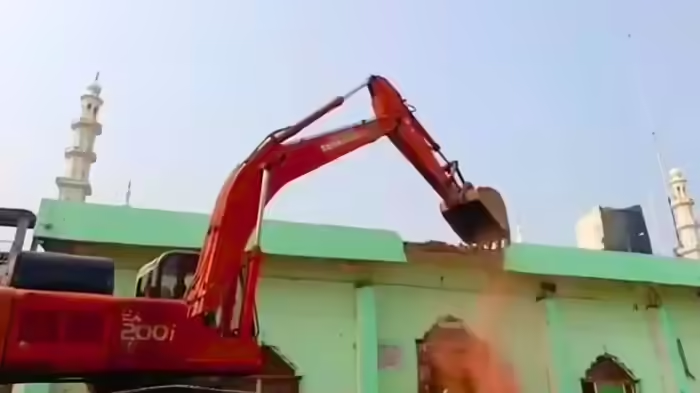
**
Ujjain: The Supreme Court of India has dismissed a plea challenging the demolition of the 200-year-old Takia Mosque in Ujjain, Madhya Pradesh. The bench, comprising Justice Vikram Nath and Justice Sandeep Mehta, observed that the case had lost relevance since the land acquisition process had been completed and compensation had already been paid.
The mosque, located near the Mahakal Temple premises, was demolished earlier this year in January 2025 to make way for the expansion of a parking facility for temple visitors. The top court upheld the Madhya Pradesh High Court’s earlier decision, effectively closing the matter.
Supreme Court’s Remark: “It’s Too Late Now”
During the hearing, Justice Nath remarked, “It’s too late now; nothing can be done.” The petitioners — Mohammad Tayyab and 12 others — had argued that the mosque was a registered Waqf property since 1985 and had been regularly used for offering prayers. They had also sought an inquiry against the District Collector and the Land Acquisition Officer, alleging procedural violations and wrongful demolition.
Petitioners’ Argument
Senior Advocate M.R. Shamshad, appearing for the petitioners, contended that the mosque was razed to create parking space for another religious site, which, according to him, violated their right to religious freedom. He also disputed the High Court’s observation that the petitioners could simply “offer prayers elsewhere.”
Regarding compensation, Shamshad alleged that the payment was made to unauthorized persons, not the rightful custodians of the mosque.
However, the Supreme Court maintained that alternate legal remedies were available for contesting compensation-related issues and that reopening the case at this stage was not feasible.
Background of the Case
The Takia Mosque, located in the holy city of Ujjain, was estimated to be around two centuries old. The Madhya Pradesh government had decided to demolish it as part of the Mahakal Temple corridor expansion project, aimed at enhancing pilgrimage facilities, including a multi-level parking structure.
After the demolition in January 2025, the petitioners approached the Supreme Court seeking restoration and compensation. With the apex court now dismissing their plea, the long-standing legal battle over the mosque’s demolition has effectively come to an end.
The court’s decision reaffirms that once land acquisition and compensation processes are legally completed, retrospective restoration claims are unlikely to succeed — no matter how historic or sensitive the structure may be.
Discover more from SD NEWS agency
Subscribe to get the latest posts sent to your email.
